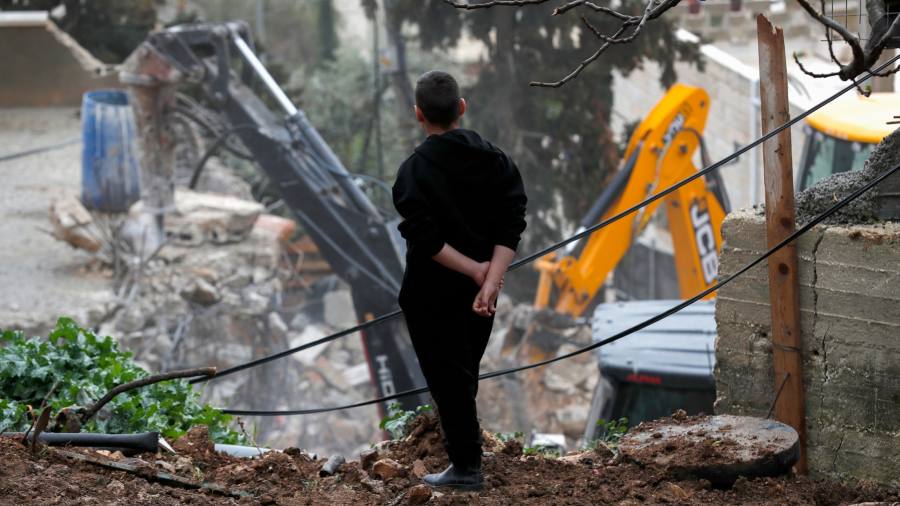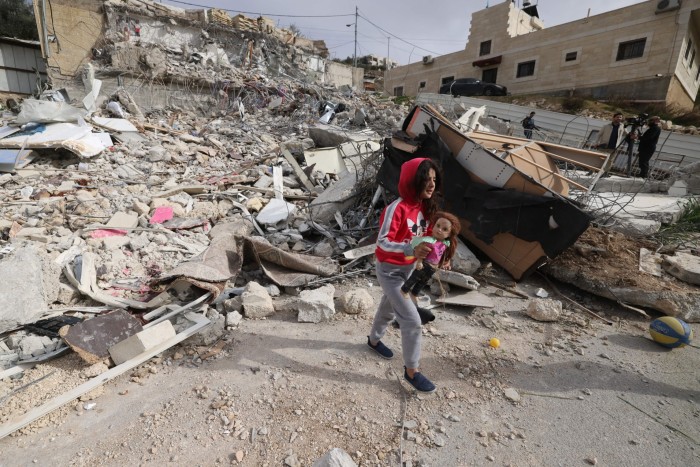
Demolitions of Palestinian homes in East Jerusalem have risen sharply under Israel’s hardline new government, threatening to inflame tensions already heightened by rising violence in the occupied West Bank.
Seventy-seven structures in East Jerusalem have been torn down since prime minister Benjamin Netanyahu’s administration took office in late December, nearly double the 40 destroyed during the same period a year earlier, according to UN data.
Demolitions of homes built without permits have been championed by Israel’s national security minister Itamar Ben-Gvir, an ultranationalist settler previously convicted of incitement to racism. The rise in destructions comes amid a sharp increase in violence in the West Bank in recent months that has fuelled fears of a broader escalation.
Activists estimate that more than 20,000 Palestinian homes in East Jerusalem, which has been occupied by Israel since 1967, have been built without a permit. Israeli law allows such buildings to be destroyed.
But Palestinians say the process of obtaining a permit is almost impossible. They view the demolitions as part of an attempt by Israel, which claims the whole of Jerusalem as its undivided capital, to cement control over the east of the city, which Palestinians want as the capital of a future state.

“They don’t want us here,” said Rateb Matar, whose house in the Jabal Mukaber neighbourhood, where he lived with his wife, Azhar, and nine relatives, was destroyed this year. “They’re trying to suffocate us. They try to make it very difficult, almost impossible [to get a permit].”
Matar said he applied for building permission in 2005, but after a decade without success — and with a growing family — he decided to press ahead. The demolition order arrived soon after. One day in January, he was woken by Israeli authorities arriving to destroy the building. Matar also has to pay for the enforcement, which activists say can cost up to $20,000.
OCHA, the UN’s humanitarian arm, said 145 people in East Jerusalem — half of them children — had been displaced by demolitions this year. In 2019, it warned that more than 100,000 Palestinians in East Jerusalem risked being displaced, adding that the “restrictive” planning regime made it “virtually impossible” for Palestinians to obtain permits.
Only 13 per cent of land in East Jerusalem has been allocated for Palestinian construction, according to OCHA, as opposed to 35 per cent for Jewish settlements — even though 360,000 Palestinians make up more than 60 per cent of the area’s population.
Daniel Seidemann, founder of an NGO focused on Jerusalem, said Israel had built about 58,000 homes for Jewish settlers in the east of the city since 1967 and fewer than 600 for Palestinians. “This has been one of the pillars of Israeli policy,” he said.
Palestinians in East Jerusalem have lived with the threat of demolitions for years. But the acceleration under the new government — which contains settlers in critical security posts who want to annex the West Bank — has set people on edge.
“The mood is very difficult,” said Raed Bashir, a lawyer who represents residents in Jabal Mukaber. “People are constantly worried.”

Israeli authorities have previously refrained from carrying out demolitions during Ramadan, but Israeli media has reported that Ben-Gvir has demanded they continue during the Muslim holy month, which starts next week.
Israel’s Channel 12 News reported last week that 25 former police chiefs and commanders had written to Ben-Gvir to warn him that his policies, including continuing demolitions in Ramadan, could touch off a third intifada, akin to the Palestinian uprisings of the 1980s and early 2000s.
Ben-Gvir dismissed the report, branding his critics people who had “destroyed the police force”. But diplomats warn that aggressive actions during Ramadan could have far-reaching consequences.
Missions from 17 countries, including the UK, France and Spain, this week called on Israel to reverse decisions to evict several families from buildings in East Jerusalem and described plans to continue the demolitions over Ramadan as “particularly worrying”.
“Israel’s illegal settlement policy fuels tensions . . . and undermines the viability of the two-state solution” they said, referring to the idea of a Palestinian state alongside Israel.
Palestinian activists express similar fears. “Because of the meaning Jerusalem carries in the minds and hearts of people, [accelerating demolitions] can definitely spark another unity uprising,” said Mounir Marjieh, an activist from the Community Action Center, which supports Palestinians in East Jerusalem.
The city “carries an explosive potential with ripples reaching not just Israel-Palestine but far beyond”, he added.
Amid the rubble that was once her home, Azhar Matar had more immediate concerns. “My husband worked all his life — I didn’t even see him much because we wanted to build this house. Now look at it,” she said.
“Why can’t I have a house? Why can’t I have a life? Why does it have to be a dream? . . . I keep thinking tomorrow will be better. But it never is.”